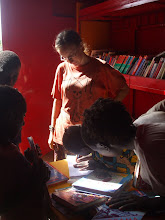Friday, March 7, 2008
Working for Peanuts
If you had asked me this time last year what I would be doing in March 2008, I would not give you the one-word answer I have now: peanuts. Yes, peanuts make up the majority of my days' activities. This is what the women of my village are doing now, every day, morning to night. Shelling peanuts, sorting peanuts, threshing peanuts, storing peanut seeds, cooking with peanuts...I'm sure it goes on! The pads of both thumbs and forefingers are rough, callused from hours of cracking the shells against a hard surface. Often the women will dampen the peanuts to make them easier to shell, but the sheer volume of them - bathtubs-full of peanuts! - overrides such efforts. Peanuts also offer social opportunities, which I enjoy. In the afternoons, women will bring their peanuts (side note: peanut shelling/threshing/sorting, etc, appears to be exclusively women's work, like so much else) into the shade of a big old neem tree, spread out their plastic mats, and talk together as they work. Often, we'll all pitch in a little money to buy tea and sugar, or packets of powdered milk, which they sweeten with mint candies and drink in the little tea-shotglasses. The Senegalese tea ceremony is very interesting. It involves slowly boiling the leaves in hot water, adding measured sugar, and frothing the liquid back and forth between a pair of cups several times, to make a foam on top; then, it is quickly consumed with a series of slurps. Same goes for the minty milk. Now, a story of the life cycle of a peanut, as I understand it: first, they are shelled (a sharp snack against a rock or wooden stool will do the trick; experts get a two-handed rhythm going on, which I am trying to emulate) and then the nuts and shells are put back in the bucket to be threshed. This means they are shaken so the lighter shells move to the top, where they are scraped off; this is repeated until only the nuts remain. The shells are later used for cooking. Next, we spread the peanuts out on trays and pick through them. The pretty ones are destined to be seeds for next year. Those that are cracked, shriveled, or misshapen will be made into "tigadegie" - peanut butter, the base of several sauces. These are also the ones that will be weighed and traded for fish, or other foods, at the boutique or traveling horse-cart salesman. So, that's what we do!
Subscribe to:
Post Comments (Atom)


1 comment:
Wow, you're all going nuts! Sorry, couldn't resist the pun :D
You should send me a list of things you'd like in a package! I keep meaning to finish it but then I get distracted, so if I have a list I might get it done and actually send it to you :D
Post a Comment